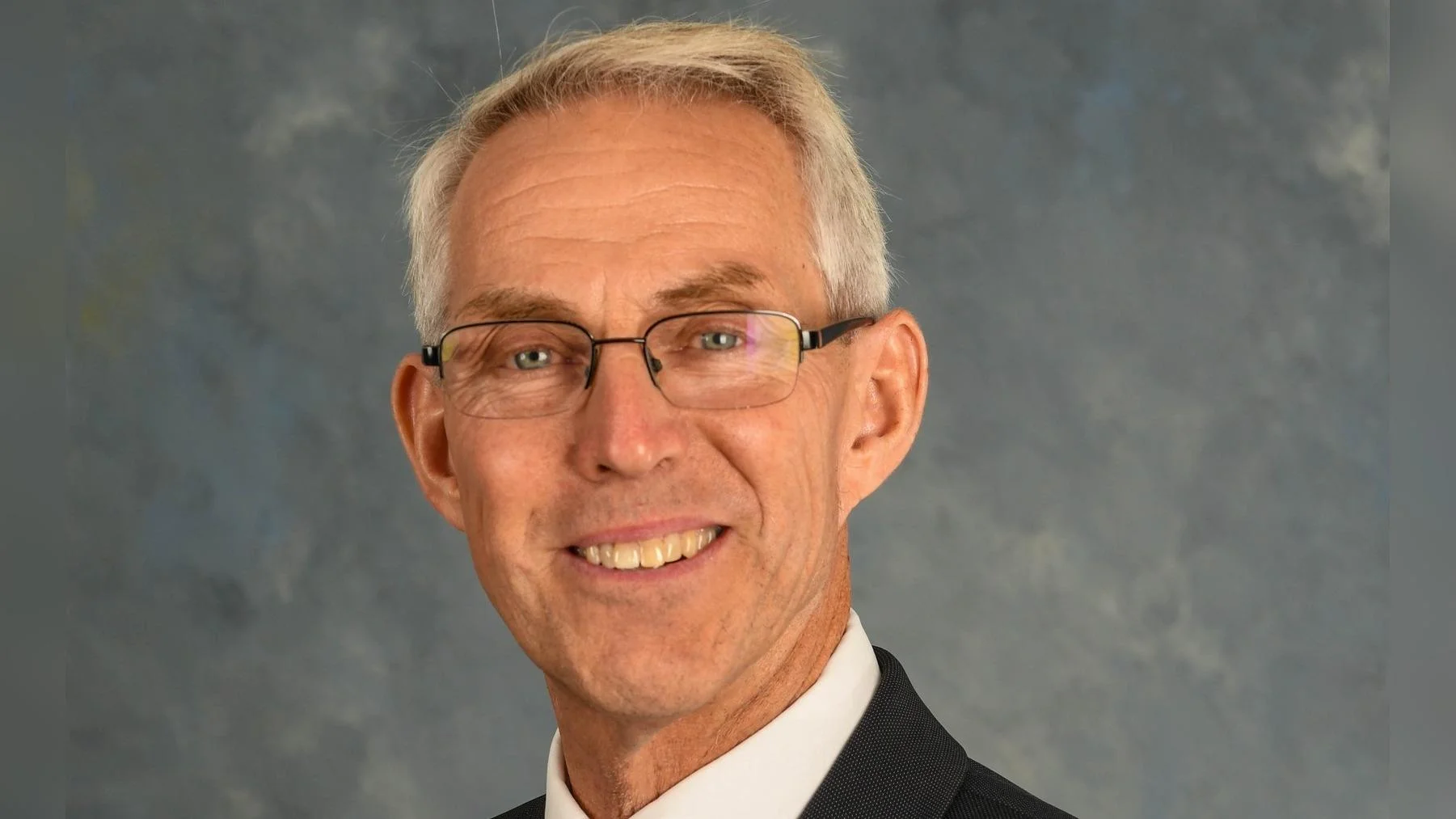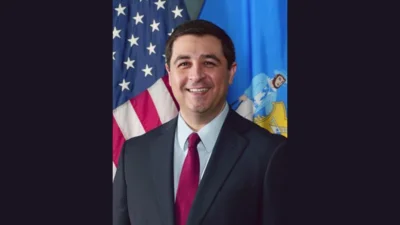Brad Halbrook, Illinois State Representative for 107th District | www.facebook.com
Brad Halbrook, Illinois State Representative for 107th District | www.facebook.com
The bill, introduced as HB4118 on Sep. 11, 2025, during the general assembly session 104, was summarized by the state legislature as follows: "Amends the Public Higher Education Act, the Board of Higher Education Act, and the Higher Education Student Assistance Act. Provides that a resident of the State who is not lawfully present in the United States is not eligible, on the basis of residence within the State, for any postsecondary educational benefit unless a citizen or national of the United States is eligible for such a benefit without regard to whether the citizen or national is such a resident. Provides that any benefit conferred to a nonresident of the State who is lawfully present in the United States may not be lesser in amount, duration, or scope than the benefit conferred to a State resident who is unlawfully present in the United States."
The following is our breakdown, based on the actual bill text, and may include interpretation to clarify its provisions.
In essence, the bill amends the Public Higher Education Act, the Board of Higher Education Act, and the Higher Education Student Assistance Act to stipulate that Illinois residents not lawfully present in the United States are ineligible for postsecondary educational benefits based on state residency unless the same benefits are equally available to U.S. citizens or nationals residing outside Illinois. It ensures that any educational benefit provided to nonresident, lawfully present individuals in the U.S. is not inferior in amount, duration, or scope compared to the benefits received by a state resident who is unlawfully present in the country. The bill mandates equitable treatment in the distribution of educational benefits among this group of students.
Halbrook has proposed another 14 bills since the beginning of the 104th session.
Bills in Illinois follow a multi-step legislative process, beginning with introduction in either the House or Senate, followed by committee review, floor debates, and votes in both chambers before reaching the governor for approval or veto. The General Assembly operates on a biennial schedule, and while typically thousands of bills are introduced each session, only a fraction successfully pass through the process to become law.
You can read more about bills and other measures here.
Halbrook, a Republican, was elected to the Illinois State House in 2023 to represent the state's 107th House District, replacing previous state representative Blaine Wilhour.
| Bill Number | Date Introduced | Short Description |
|---|---|---|
| HB4118 | 09/11/2025 | Amends the Public Higher Education Act, the Board of Higher Education Act, and the Higher Education Student Assistance Act. Provides that a resident of the State who is not lawfully present in the United States is not eligible, on the basis of residence within the State, for any postsecondary educational benefit unless a citizen or national of the United States is eligible for such a benefit without regard to whether the citizen or national is such a resident. Provides that any benefit conferred to a nonresident of the State who is lawfully present in the United States may not be lesser in amount, duration, or scope than the benefit conferred to a State resident who is unlawfully present in the United States. |
| HB4114 | 09/08/2025 | Amends the School Code. In provisions concerning mental health screenings, removes the requirement that the State Board of Education report its work and make available resource materials, including model procedures and guidance informed by a phased approach to implementing universal mental health screening in schools, on or before September 1, 2026. Also removes the requirement that school districts offer, beginning with the 2027-2028 school year, mental health screenings to students in grade 3 through grade 12. Effective January 1, 2026. |
| HB4115 | 09/08/2025 | Amends the School Code. In provisions concerning student mental health screenings, requires the State Board of Education's model school district procedures to facilitate the implementation of mental health screenings to include the option to opt in (rather than opt out) and a minimum of 3 written notifications each school year about the use of mental health screenings, one of which must be delivered by first-class mail, to a student's parent or guardian. Effective January 1, 2026. |
| HB3532 | 02/07/2025 | Amends the Reproductive Health Act. Requires any health care professional, entity, person, clinic, or school to obtain the written consent from a minor's parent or guardian before any health care professional, entity, person, clinic, or school may provide a minor who is under the age of 18 years any non-emergency medical procedure, medication, pharmaceutical, or any gender-modification procedure, gender-identification counseling, or gender therapy. |
| HB3257 | 02/06/2025 | Amends the Highway Advertising Control Act of 1971 and the Illinois Highway Code. Allows the Department of Transportation to post tourist oriented directional signs at intersections in rural areas at all sections of rural non-freeways except those passing through urban areas with populations of 7,000 or more. |
| HB3258 | 02/06/2025 | Amends the Illinois Power Agency Act. Removes language regarding: diversity requirements related to the design of all programs and procurements; the development of methods that optimize procurement of renewable energy credits from proposed utility-scale projects that are located in communities eligible to receive Energy Transition Community Grants; diversity requirements related to the eligibility criteria for the selection as a supplier of renewable energy credits; the assessment of fees to recover specified costs incurred by the Illinois Power Agency; diversity requirements related to the criteria for an owner to receive grants from the Coal to Solar and Energy Storage Initiative Fund; the provision of information on renewable energy company diversity reporting via the Agency's public facing online tool; and diversity, equity, and inclusion plans. |
| HB3259 | 02/06/2025 | Amends the Military Veterans Assistance Act. Expands the Act to allow for the formation of multi-county Veterans Assistance Commissions. Provides that veteran service organizations located in 2 or more adjacent counties having a population of 60,000 or less may enter into an agreement to come together and jointly form a multi-county Veterans Assistance Commission to serve the adjacent counties in accordance with the Act. Provides that a multi-county Veterans Assistance Commission may also be formed under an agreement between an existing county Veterans Assistance Commission and a veteran service organization located in an adjacent county that is without a veterans assistance commission and has a population of 60,000 or less. Requires an agreement to form and maintain a multi-county Veterans Assistance Commission to set forth: (i) the distribution of funding with respect to each member county; (ii) the location of the Commission's office; (iii) the type of services provided; (iv) the superintendent selection or appointment process; (v) Commission rules and policies; and (vi) the composition of delegates and alternates on the Commission. Provides that multi-county Veterans Assistance Commissions shall have the same powers and duties under the Act as Veterans Assistance Commissions that serve one county. Makes corresponding changes in the Counties Code, the Illinois Public Aid Code, the Drug Court Treatment Act, the Veterans and Servicemembers Court Treatment Act, and the Mental Health Court Treatment Act. Effective immediately. |
| HB3260 | 02/06/2025 | Amends the Township Code. In provisions concerning caucuses held by the voters of each established political party in a township to nominate its candidates for various offices, requires notice of the caucus to be given at least 20 days (rather than 10 days) before the caucus is held. Provides that, not less than 45 days (rather than 30 days) before the caucus, the township clerk shall notify the chairman or membership of each township central committee by first-class mail of the chairman's or membership's obligation to report the time and location of the political party's caucus. Provides that, not less than 30 days (rather than 20 days) before the caucus, each chairman of the township central committee shall notify the township clerk by first-class mail of the time and location of the political party's caucus. |
| HB3261 | 02/06/2025 | Amends the Use Tax Act and the Retailers' Occupation Tax Act. Creates a sales tax holiday period for school supplies from August 1, 2025 through August 31, 2025 and from August 1 through August 31 of each year thereafter. Amends the State Finance Act to make conforming changes. |
| HB1495 | 01/21/2025 | Amends the Department of Revenue Law of the Civil Administrative Code of Illinois. Provides that the Department of Revenue shall establish and administer a property tax relief pilot program. Provides that eligible homeowners shall receive a one-time direct relief payment in an amount equal to a percentage, determined by the Department by rule, of the eligible homeowner's property tax liability for the 2025 tax year. Requires the Department of Revenue to submit a report in connection with the Program to the Governor and the General Assembly. Creates the Property Tax Relief Program Fund of 2026. Provides that moneys in the Fund shall be used by the Department for the purpose of making property tax relief payments. Amends the State Finance Act to make conforming changes. |
| HB1496 | 01/21/2025 | Amends the Property Tax Code. Provides that, beginning with the 2026 assessment year, the valuation of property in any general assessment year may not exceed (i) 101% of the value of the property in the previous tax year if the property is residential or (ii) 102% of the value of the property in the previous tax year if the property is not residential. Provides that the limitation does not apply if the increase in value is due to an addition, modification, or improvement to the property or if there has been a change in ownership of the property during the previous tax year. Preempts the power of home rule units to tax. |
| HB1497 | 01/21/2025 | Amends the Property Tax Extension Limitation Law in the Property Tax Code. Provides that, for levy years 2026 through 2030, the term "taxing district" includes each home rule taxing district. Provides that, for levy years 2026 through 2030, the extension limitation is 0% or the rate of increase approved by the voters. Contains provisions setting forth the aggregate extension for taxing districts that became subject to the Property Tax Extension Limitation Law as a result of the amendatory Act. Sets forth powers and duties of the Department of Revenue. Limits the power of home rule units to tax. Effective immediately. |
| HB1500 | 01/21/2025 | Creates the Illinois-Indiana Boundary Adjustment Commission Participation Act. Provides that, if and only if House Bill 1008 of the 124th Indiana General Assembly becomes law, then, no more than 60 days after receiving a specified notice from the Governor of Indiana, the Governor shall appoint 5 members to the Illinois-Indiana Boundary Adjustment Commission. Set forth provisions concerning terms, vacancies, and reimbursement. Provide that, no later than 60 days after the completion of the Illinois-Indiana Boundary Adjustment Commission's duties, the members appointed under the Act shall submit a report to the General Assembly. Effective immediately. |
| HB1400 | 01/16/2025 | Amends the Time Standardization Act. Provides that daylight saving time shall be the year-round standard time of the entire State. Makes other changes. |
| HB1347 | 01/14/2025 | Amends the Environmental Protection Act. In a provision regarding prohibited acts, provides that no person shall operate a commercial energy conversion facility in a manner that causes, threatens, or allows the release of oil, lubricant, hydraulic fluid, transformer solvent, insulation fluid, cleaning fluid, or any other similar fluid from the facility. Provides that any person who violates this prohibition shall, for each day of violation, be liable for a civil penalty of $1,000. Provides for a 100% reduction in penalty for a person who promptly self-discloses noncompliance with this provision and promptly begins repairs. |






 Alerts Sign-up
Alerts Sign-up